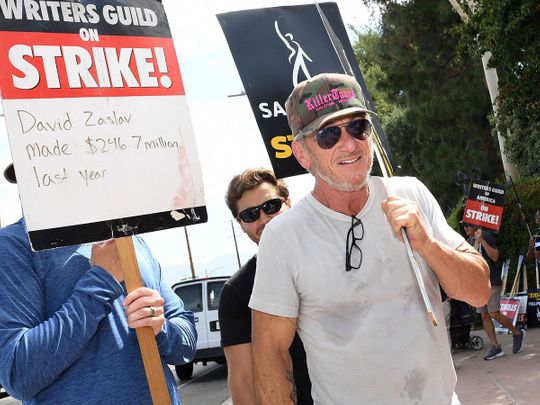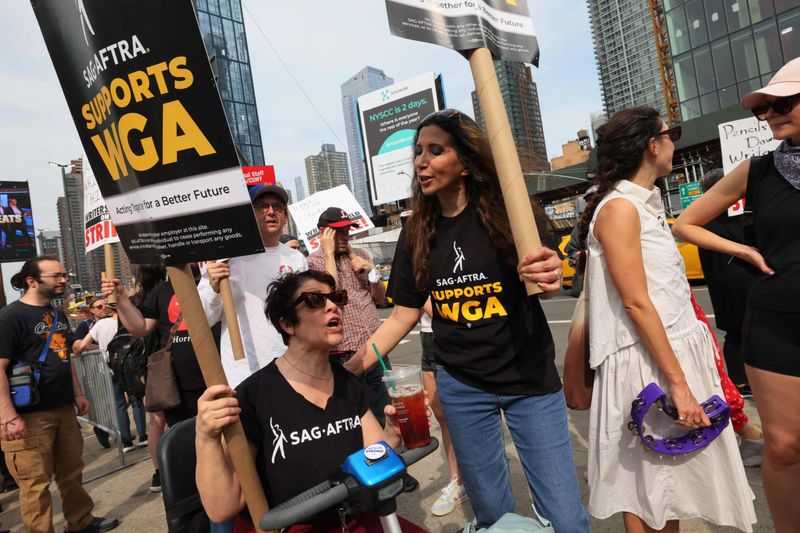
Writers exploded with fury Wednesday after offers from the studios were made public - an attempt, the writers said, to divide them as their strike drags past 100 days.
The release came after a meeting Tuesday night between Writers Guild of America negotiators and the heads of major studios, including Bob Iger of Disney. Typically the studios have been represented by labor lawyers who negotiate on their behalf with the writers union. The meeting was unusual.
It did not go well.
"This wasn't a meeting to make a deal. This was a meeting to get us to cave," WGA negotiators said in a message to members late Tuesday.
"Which is why, not 20 minutes after we left the meeting, the AMPTP released its summary of their proposals," the WGA said. They have been at loggerheads with the Alliance of Motion Picture and Television Producers, the labor negotiating arm for major studios and streaming services. "This was the companies' plan from the beginning - not to bargain, but to jam us. It is their only strategy - to bet that we will turn on each other."
The writers strike is now dragging toward its 115th day, and despite consistent displays of unity and well-staffed picket lines, writers are increasingly eager for it to end. Many union members are running through their dwindling savings, and with actors reaching 40 days of striking, Hollywood is at a standstill.
Nevertheless, writers and actors say they will not cave because their industry is at an existential moment - even if studios don't see it that way.
The studios' offer - which dates from Aug. 11 and is the only offer they have made in writing - does much to sweeten the pot for what writers were seeking, without addressing their demands in total.
"Our priority is to end the strike so that valued members of the creative community can return to what they do best and to end the hardships that so many people and businesses that service the industry are experiencing," Carol Lombardini, president of the AMPTP, said in a statement accompanying the offer. "We have come to the table with an offer that meets the priority concerns the writers have expressed. We are deeply committed to ending the strike and are hopeful that the WGA will work toward the same resolution."

Studios are facing decisions about whether to cancel or push back planned release dates for movies including "Spider-Man: Beyond the Spider-Verse" and "Ghostbusters: Afterlife." Amazon recently canceled a second season of "A League of their Own."
The studio offer makes significant concessions in wage increases and begins to address writers' concerns about streaming, artificial intelligence and "writers rooms" - how many writers can be hired on a show - without going nearly as far as writers would like.
The Writers Guild statement said in response that the offer's "limitations and loopholes and omissions failed to sufficiently protect writers from the existential threats that caused us to strike in the first place."
On the issue of the writers room for example, room sizes have been slipping from six to eight writers under the direction of a head writer, or "showrunner," to around four or five plus the showrunner. The Writers Guild's demand was for a minimum of six writers, including the showrunner, with the ability to hire more depending on the number of episodes in a series.
The studios' offer is for a total of three writers, the showrunner and two others. Many writers would probably find this unacceptable not just because fewer people would get employed, but also because the jobs would be unlikely to go to young writers starting out. The result would be to gradually squeeze Hollywood of its pool of experienced writers who are familiar with various aspects of the production process, according to fears expressed by writers interviewed in recent days on picket lines.
On the issue of artificial intelligence, the studios' offer puts various protections around the use of AI , specifying that it would not be viewed as "a person." However, it does not agree to writers' demand that AI-produced writing not be used as source material, or that writing produced by guild writers not be allowed to "train" AI.
Shock waves from the latest blowup leave the landscape unclear. Writers and actors believe they are striking at a moment when Hollywood is changing in so many ways that the outcome will determine whether it remains a place where talented writers and actors want to come to seek out work - which in turn will determine how Americans consume entertainment for decades to come.








